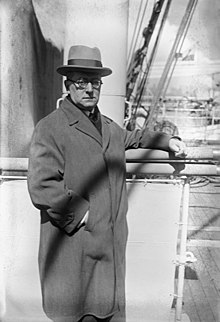
Carl Flesch (born Károly Flesch, 9 October 1873 – 14 November 1944) was a Hungarian classical violinist and teacher. Flesch’s compendium Scale System is a staple of violin pedagogy.
Life and career
Flesch was born in Moson (now part of Mosonmagyaróvár) in Hungary in 1873. He began playing the violin at seven years of age. At 10 he was taken to Vienna to study with Jakob Grün. At 17 he left for Paris, and joined the Conservatoire de Paris, studying with Martin Pierre Marsick. He settled in 1903 in Amsterdam, in 1908 in Berlin, and in 1934 in London.
He was known for his solo performances in a very wide range of repertoire (from Baroque music to contemporary), gaining fame as a chamber music performer. He also taught in Bucharest (1897–1902), Amsterdam (1903–08), Philadelphia (1924–28) and Berlin (Hochschule für Musik, 1929–34). He published a number of instructional books, including Die Kunst des Violin-Spiels (The Art of Violin Playing, 1923) in which he advocated for the violinist as artist rather than merely virtuoso. Among his pupils were Charles Barkel, Edwin Bélanger, Norbert Brainin, Felix Galimir, Bronislaw Gimpel, Ivry Gitlis, Szymon Goldberg, Ida Haendel, Zvi (Heinrich) Haftel, Josef Hassid, Adolf Leschinski, Alma Moodie, Ginette Neveu, Yfrah Neaman, Ricardo Odnoposoff, Eric Rosenblith, Max Rostal, Henryk Szeryng, Henri Temianka, Roman Totenberg and Josef Wolfsthal, all of whom achieved considerable fame as both performers and pedagogues. He said his favorite pupil was the Australian Alma Moodie, who achieved great fame in the 1920s and 1930s but made no recordings and is little known today. In his memoirs he said, "there was above all Henry Temianka, who did great credit to the Institute: both musically and technically, he possessed a model collection of talents." See: List of music students by teacher: C to F#Carl Flesch.
One of Flesch's few recordings is a highly distinguished interpretation of Bach's great D minor Double Violin Concerto (Columbia) in which he played second violin to the great Joseph Szigeti, with Walter Goehr conducting an anonymous London string orchestra in the late 1930s.
He was consulted (as was Oskar Adler) by Louis Krasner over technical difficulties in Alban Berg's Violin Concerto, which Krasner was to premiere.
He owned the Brancaccio Stradivarius, but had to sell it in 1931 after losing all his money on the New York Stock Exchange.
Because of his Jewish origins, Flesch had to move to London during the 1930s, and was later arrested by the Gestapo in the Netherlands, was released thanks to Furtwängler's intervention, and died in Lucerne, Switzerland, in November 1944.
References
- Kay Dreyfus, Alma Moodie and the Landscape of Giftedness, 2002
- Carl Flesch: The Memoirs of Carl Flesch (trans. Hans Keller and ed. by him in collaboration with C.F.Flesch); foreword by Max Rostal (1957)
- "Károly Flesch | Hungarian violinist and teacher | Britannica".
- Carl Flesch The memoirs of Carl Flesch - 1979 "Thus both my parents stayed on in Holland. My father was, of course, not allowed to teach or play and occupied most of ... Both my parents were arrested twice but my father had been lucky enough to have in his possession a letter from ..."
- Alma Rosé: Vienna to Auschwitz Richard Newman, Karen Kirtley - 2000 "same day Alma, in despair, wrote a letter of farewell to Carl Flesch, who was still in Holland, protected since March by his status as a "blue knight"
- Special treatment: the untold story of Hitler's third race Alan E. Abrams - 1985 "They were the Hungarian-born, internationally renowned violinist and composer Carl Flesch and his wife, the Dutch-born former Berta Josephus "
- F. C. DeCoste, Bernard Schwartz The Holocaust's ghost: writings on art, politics, law, and education - 2000 p79 " ... and therewith stopped his visits, only to find himself back in Gestapo custody after the Netherlands, where he had moved, was overrun. "
- "Manuskriptdienst SWR2 Stolpersteine Carl Flesch" (PDF).
- Carl Flesch: The Memoirs of Carl Flesch (trans. Hans Keller and ed. by him in collaboration with C.F.Flesch); foreword by Max Rostal (1957).
- Carl Flesch: The Art Of Violin Playing, Books 1 & 2 Translated & Edited by Eric Rosenblith. New York: Carl Fischer Music © Edition ISBN 0-8258-2822-8
- Boris Schwarz: Great Masters of the Violin; foreword by Yehudi Menuhin. New York: Simon and Schuster © 1983.
External links
- Flesch Károly Violin Competition
- A page on Flesch by José Sánchez-Penzo
- Works by Carl Flesch at Project Gutenberg
- Works by or about Carl Flesch at the Internet Archive
- Carl Flesch Archive in the Netherlands Music Institute, with biography
- Free scores by Carl Flesch at the International Music Score Library Project (IMSLP)
- 20th-century Hungarian classical violinists
- Jewish classical violinists
- Hungarian male classical violinists
- Violin educators
- Hungarian music educators
- Hungarian Jews
- Jews from Austria-Hungary
- Expatriates from Austria-Hungary in the Netherlands
- Expatriates from Austria-Hungary in Germany
- People from Mosonmagyaróvár
- 1873 births
- 1944 deaths